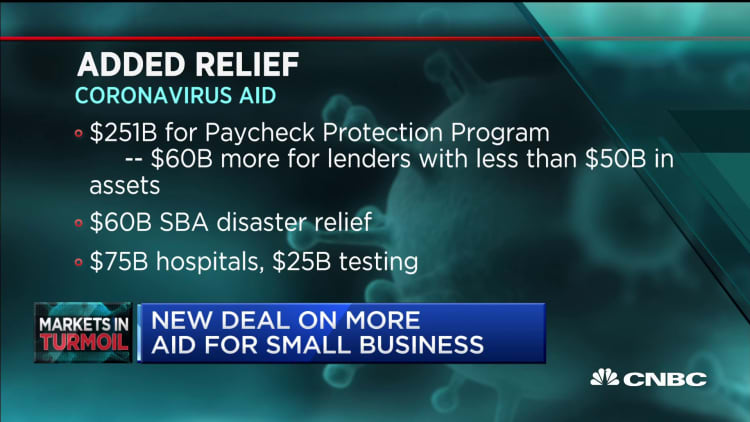
The Senate on Tuesday passed a $484 billion package to bolster small businesses and hospitals ravaged by the coronavirus pandemic and expand testing for Covid-19.
After the unanimous Senate vote, the bill heads to the House, which aims to approve it by Thursday.
The measure injects another $310 billion into a key loan program designed to keep employees on small company payrolls. The initial $350 billion in the so-called Paycheck Protection Program, created as part of the $2 trillion rescue package passed last month, dried up last week. It is unclear how many firms have actually received the money.
The bill passed Tuesday allocates $60 billion for small lenders as part of the small business aid program. It puts another $60 billion toward Small Business Administration disaster assistance loans and grants. It includes $75 billion in hospital relief and $25 billion for coronavirus testing.
The bill piles more money into an unprecedented government effort to relieve an economy and health-care system devastated by the coronavirus outbreak. More than 22 million people filed for unemployment benefits over the latest four-week period as businesses in most of the country remain closed to slow Covid-19's spread.
The small business loans, forgivable if recipients use the money for wages, benefits, rent and utilities, are designed to keep employees on the payroll. The money dried up quickly, though, leaving numerous small businesses in limbo. The fact that some larger chain companies benefited from the first round of funding increased frustrations for firm owners who did not receive loans.
Earlier this month, Democrats rejected a Republican proposal to put $250 billion into the existing small business program. Democrats pushed for tweaks, including more money for rural and minority-owned small businesses and additional funding for SBA disaster assistance loans and grants. They also sought more money for hospitals, states and municipalities — though Republicans opposed funding for governments, which the bill passed Tuesday did not include.
The GOP accused Democrats of abandoning small business owners and workers by not quickly injecting money into the program.
"I am just sorry that it took my colleagues in Democratic leadership 12 days to accept the inevitable, and that they shut down emergency support for Main Street in a search for partisan 'leverage' that never materialized," Senate Majority Leader Mitch McConnell said Tuesday before the Senate passed the legislation.
Speaking ahead of the vote, Senate Minority Leader Chuck Schumer called the bill "significantly better and broader" than the one Democrats blocked earlier this month. He said it is more "effective' and "inclusive," adding that it addressed additional priorities such as hospital funding and testing.
Even as the bill passed with no opposition, two senators out of the handful of lawmakers present Tuesday criticized the chamber's process. Sen. Mike Lee, R-Utah, argued that the Senate should stop trying to pass legislation by unanimous vote and bring back lawmakers for an official tally.
Sen. Rand Paul, R-Ky., criticized the staggering sums of taxpayer money Congress has directed toward the crisis, contending the U.S. should reopen its economy instead.
Congress will likely pass one or more additional bills to try to rescue the economy after it approves the emergency small business bill. Democrats plan to push to expand vote-by-mail during the pandemic, extend the enhanced unemployment insurance passed last month and increase protections for Americans still required to go into work.
Schumer said he would seek money for the U.S. Postal Service, assistance for renters and hazard pay for workers.
In tweets Tuesday, President Donald Trump said he wanted to see relief for state and local governments, along with infrastructure funding and a payroll tax cut, in the next congressional package.


